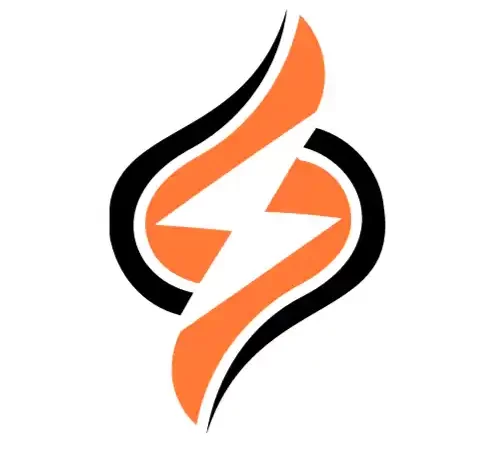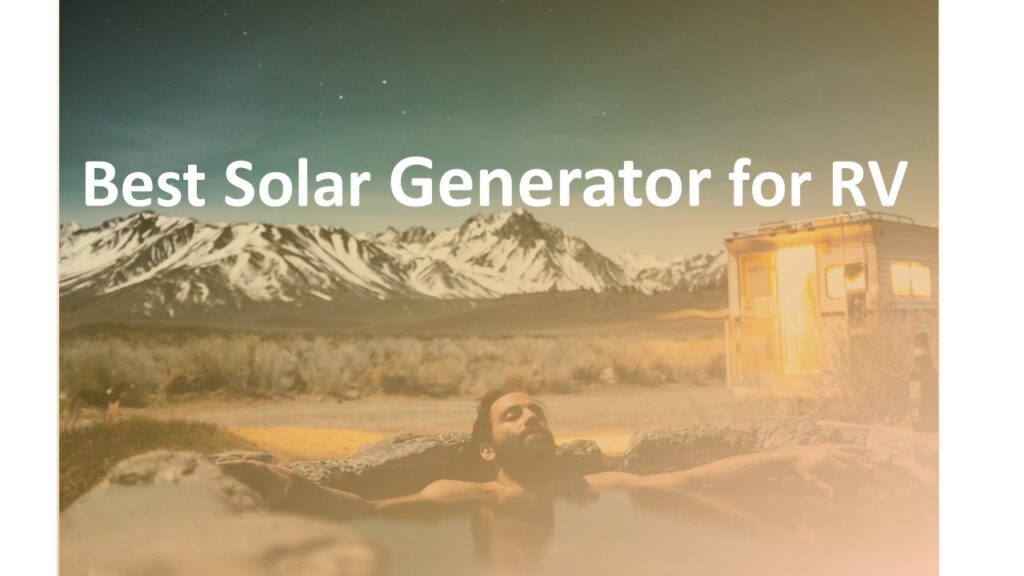Are you tired of relying on noisy and expensive gas generators to power your RV? Are you ready to embrace a more sustainable and cost-effective solution? Look no further than the solar generator for RV.
By harnessing the power of the sun, solar generators offer unlimited and clean energy, making them the perfect solution for off-the-grid RV living. In this article, we’ll explore the benefits of using a solar generator for an RV, and how it can revolutionize your outdoor adventures.
What is a solar generator?
You may have heard the term “solar generator” before, but what exactly does it mean? Simply put, a solar generator is a device that uses solar panels to convert sunlight into electricity, which is then stored in a battery for later use.
Unlike traditional generators that require fuel to create power, solar generators are powered by the sun and produce clean and renewable energy.
This not only makes them more sustainable and eco-friendly but also quieter and more cost-effective in the long run. In fact, solar-powered generators are ideal for RV owners who want to reduce their carbon footprint and enjoy the peace and quiet of nature without disturbing the wildlife around them.
So, if you’re looking for a more sustainable and convenient power source for your RV, a solar generator is the way to go.
Benefits of using a solar generator
Using a solar-powered generator for an RV has several advantages over traditional generators. Consider the following benefits:
Cost savings: Solar-powered generators can save you money in the long run by reducing your reliance on expensive gas generators. They require little to no maintenance and have a longer lifespan than traditional generators, which means you’ll save on repair and replacement costs.
Environmental benefits: By using a solar-powered generator, you’re reducing your carbon footprint and helping to protect the environment for future generations. This makes them the perfect solution for eco-conscious RV owners who want to enjoy the great outdoors without harming it
Noise reduction: Unlike gas generators, solar-powered generators are virtually silent, which means you won’t have to deal with the noise and smell that comes with traditional generators. This makes for a more peaceful and enjoyable outdoor experience.
Portability: Solar generators are typically compact and lightweight, which makes them easy to transport and store in your RV. This means you can take them on the road with you and enjoy unlimited power wherever your adventures take you.
By using a solar generator for your RV, you can enjoy all these benefits and more.
Types of solar generators
Solar generators come in a variety of types, each with its own unique features and benefits. When it comes to choosing a solar generator for RV living, the two most common types of solar generators are portable and whole-house generators.
Portable solar generators are ideal for RV owners who want to take their power source with them on the road. These RV Solar powered generators are typically compact and lightweight, making them easy to transport and store in your RV. They can power small appliances and electronics, making them perfect for weekend trips or camping excursions.
On the other hand, whole-house solar generators are designed to power larger homes and RVs. These generators are more powerful and can run appliances like air conditioners and refrigerators. They are typically more expensive than portable solar generators, but they offer a more permanent and reliable power source for your RV.
When choosing a solar generator for your RV, it’s important to consider factors like wattage, battery capacity, and weight. You’ll also want to choose a generator that’s compatible with your RV’s electrical system. Ultimately, the right solar generator for you will depend on your power needs and budget
How do solar generators work?
As discussed previously, portable solar generators work by harnessing the power of the sun to generate electricity.
The process starts with solar panels, which are made up of photovoltaic (PV) cells. These cells are made of semiconductor material, such as silicon, and are designed to capture sunlight and convert it into electricity.
When sunlight hits the PV cells, it knocks electrons loose from their atoms, creating a flow of electricity. This electricity is direct current (DC) electricity, which is then sent to a charge controller. The charge controller regulates the flow of electricity to the battery, ensuring that it’s charged safely and efficiently.
The battery is crucial in a solar power station. It stores electricity from solar panels. When needed, the battery sends electricity. An inverter converts DC to AC electricity. This is the type of electricity used to power most household appliances and electronics.
Overall, solar generators work by converting sunlight into clean and renewable energy, which is then stored in a battery and converted into usable electricity. This process is efficient, cost-effective, and sustainable, making it the perfect solution for RV owners who want to power their adventures off the grid.
Embed previous blog post “The top 10 best solar generators for off-grid living”
Choosing the right solar generator
Choosing the right solar generator for your RV can be overwhelming, but there are several factors to consider to make the process easier.
Wattage: First, you’ll want to consider the wattage of the generator. This will determine how much power it can produce and which appliances it can run. A good rule of thumb is to choose a generator with at least 1000 watts of power for RV use.
Battery Capacity: Next, you’ll want to consider the battery capacity. This will determine how long the generator can provide power without needing to be recharged. A larger battery capacity will provide more power, but it will also be heavier and more expensive. You’ll want to find a balance between battery capacity and weight to ensure that the generator is portable and easy to transport.
Weight: Finally, you’ll want to consider the weight of the generator. This is particularly important for RV owners, as you’ll need a generator that is lightweight and easy to move around. A good weight range for RV solar generators is between 20 and 50 pounds.
When it comes to top-rated brands of solar generators for RV use, there are several options to consider. Here are some of the best:
Jackery:
Known for its high-quality and reliable portable solar station, Jackery offers a range of products that are perfect for RV use.
You can check out our latest guides “Jackery 3000 Pro: The Ultimate Off-Grid Solution Reviewed“
We have also reviewed all the Jackery Solar Power Stations, Click our detailed Guide here
Goal Zero:
A popular brand that offers a range of portable solar-powered stations with high wattage and battery capacity. They also offer a variety of accessories to enhance your RV power system.
You may be interested in our blog post titled “Portable Power Two Ways: Jackery vs Goalzero” which compares these two popular portable solar generator brands.
Anker Power:
Known for their affordable and compact portable solar generators, Anker Power is a great option for RV owners looking for a reliable and lightweight power source.
Renogy:
A well-respected brand that offers affordable and reliable solar generators for RV use. They also offer a range of solar panels and accessories to customize your power system.
You may want to check out our “10+ Best Solar Generators for Off-Grid Living in 2023” guide, where we feature Renogy and other top-rated solar generators for off-grid living.
When selecting a solar generator for your RV, it’s important to consider factors like wattage, battery capacity, and weight. By choosing a reputable brand and considering your specific power needs, you can find the perfect solar power station to meet your RV needs.
Solar generator installation
Installing a solar generator for RV can be a great way to enjoy the benefits of solar power while on the go. While some RV owners prefer to hire a professional installer, others may choose to install the generator themselves.
DIY Installation
If you’re considering a DIY installation, here are the basic steps you’ll need to follow:
- Determine the best location for your solar panels. This will depend on factors like the orientation of your RV and the amount of sunlight you expect to receive.
- Install the solar panels using mounting brackets or adhesive. Be sure to follow the manufacturer’s instructions carefully to ensure that the panels are installed correctly and securely.
- Connect the solar panels to the solar charge controller. This device will regulate the amount of power that flows from the panels to the battery.
- Connect the solar charge controller to the battery. This will allow the battery to store the power generated by the solar panels.
- Connect the inverter to the battery. This device will convert the DC power stored in the battery to AC power that can be used to power your RV appliances.
Hiring a Professional Installer
While a DIY installation can save you money, it’s important to note that there are some potential risks and drawbacks. For example, if you don’t have experience working with electrical systems, you could risk damaging your RV or even causing a fire.
Additionally, if you make a mistake during the installation, you may not be covered under your solar generator warranty.
That’s when you might consider hiring a professional installer for the job. A professional installer will have the expertise and experience needed to install your solar generator correctly and safely.
They can also help you choose the best location for your solar panels, ensuring that you receive optimal sun exposure.
Finally, hiring a professional installer can give you peace of mind knowing that your solar power station is installed correctly and is covered under warranty.
Whether you choose to install your solar generator yourself or hire a professional installer, be sure to consider the pros and cons of each option and choose the one that is best for you and your RV.
Maintenance and troubleshooting
A solar generator for RV can be a great investment for you, but it’s important to keep it well-maintained to prevent issues and ensure that it continues to function properly. Here are some tips for maintaining your portable power station:
Keep the solar panels clean
Dirt and debris can accumulate on the solar panels, reducing their efficiency. Clean the panels regularly with a soft cloth or brush to keep them free of debris.
Check the battery regularly
Make sure that the battery is charged and functioning properly. If the battery isn’t holding a charge, it may need to be replaced.
Inspect the wiring and connections
Make sure that all of the wiring and connections are secure and free of damage. Loose or damaged connections can reduce the efficiency of your solar generator.
Monitor your power usage
Be aware of how much power you’re using and adjust your usage as needed to prevent overloading your solar generator.
Despite your best efforts, there may be times when your RV solar power station experiences problems. Here are some common issues with solar-powered generators and how to troubleshoot them:
Battery won’t hold a charge
If your battery isn’t holding a charge, it may need to be replaced. Check the manufacturer’s warranty to see if the battery is covered.
Inverter isn’t working
If the inverter isn’t converting DC power to AC power, check the wiring and connections. Make sure that all of the connections are secure and that the wiring isn’t damaged.
Solar panels aren’t producing enough power
If your solar panels aren’t producing enough power, check for damage or shading. Make sure that the panels are positioned correctly and receive optimal sun exposure.
By following these tips for maintenance and troubleshooting, you can keep your solar power station functioning properly and avoid common issues. If you’re unsure about how to perform maintenance or troubleshoot a problem, don’t hesitate to contact a professional for assistance.
Solar generator accessories
In addition to the solar generator for RV itself, there are several accessories that are essential for maximizing the efficiency and effectiveness of your RV solar power system. Here are some of the most important solar-powered generator accessories to consider:
Solar panels: Solar panels are the primary component of a solar power system. They are responsible for capturing the sun’s energy and converting it into usable electricity. When choosing solar panels for RV, consider factors like wattage, efficiency, and durability.
Batteries: Solar power stations rely on batteries to store the energy generated by the solar panels. The type of battery you choose will depend on factors like your power needs and budget. Popular types of batteries for solar-powered generators include lithium-ion and lead-acid.
Cables and connectors: Cables and connectors are essential for connecting the solar panels to the solar charge controller, battery, and inverter. When choosing cables and connectors, make sure they are the correct size and rating for your system.
Inverters: Inverters are responsible for converting the DC power stored in the battery to AC power that can be used to power your RV appliances. When choosing an inverter, consider factors like wattage, efficiency, and waveform.
While these are essential RV solar-powered generator accessories, there are also several additional accessories that can enhance your RV solar power system. These include charge controllers, solar trackers, and monitoring systems.
When selecting accessories for your solar-powered portable power station, it’s important to choose high-quality, reliable products that are compatible with your specific solar generator model. By choosing the right accessories and maintaining them properly, you can maximize the efficiency and effectiveness of your RV solar power system.
Best Solar generator for RV Reviews
When it comes to selecting the best solar generator for your RV, there are several factors to consider, including features, price, and performance. Here are some of the top-rated solar generators for RV owners, you may consider purchasing for your RV living:
Disclosure: As an Amazon Associate, we may earn commissions from qualifying purchases made through links in this post at no additional cost to you. This helps support our work and enables us to continue providing you with valuable content. Thank you for your support!
1. Jackery 3000 Pro:
The Jackery 3000 Pro is a powerful solar powerhouse that is perfect for off-grid adventures. With its impressive 3024Wh capacity and 3000W output power, it can accommodate most RV appliances and electronics. The Jackery 3000 Pro can be charged using solar panels or a wall outlet, and its fast charging times ensure that you can get back to exploring in no time. Additionally, the Jackery 3000 Pro is designed to be lightweight and portable, making it easy to transport wherever your journey takes you.
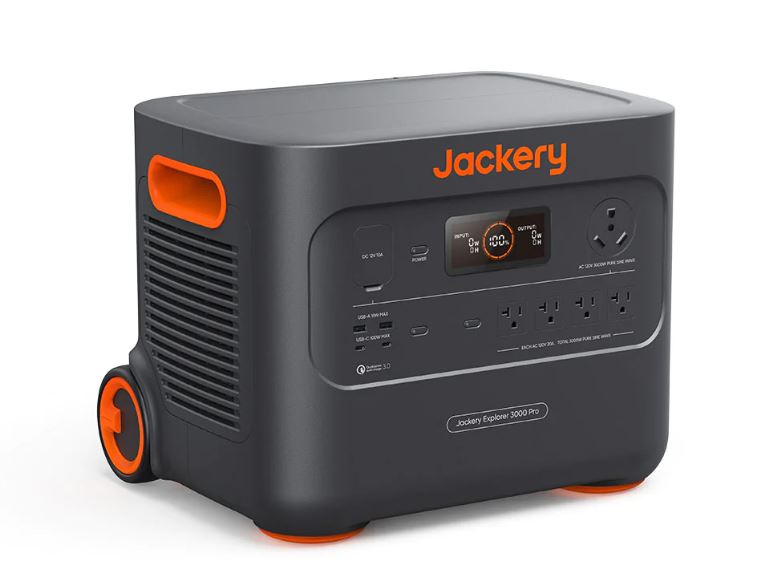
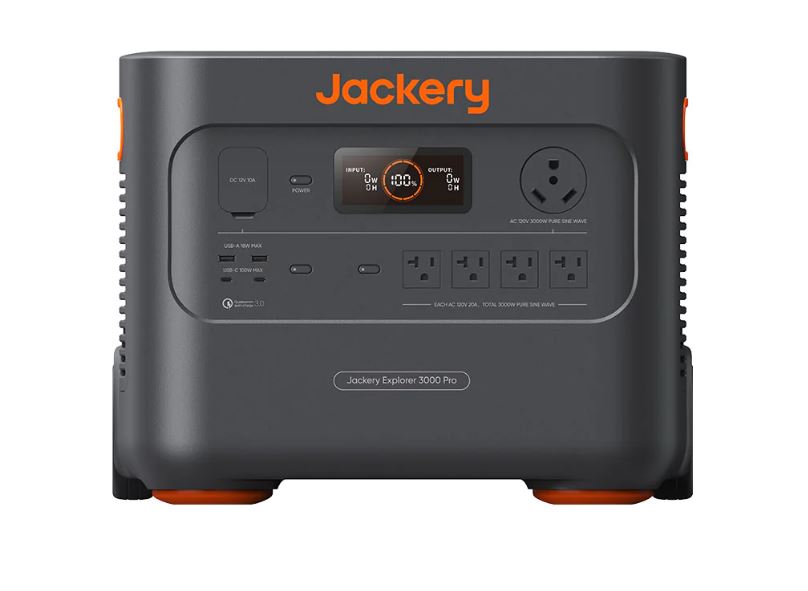
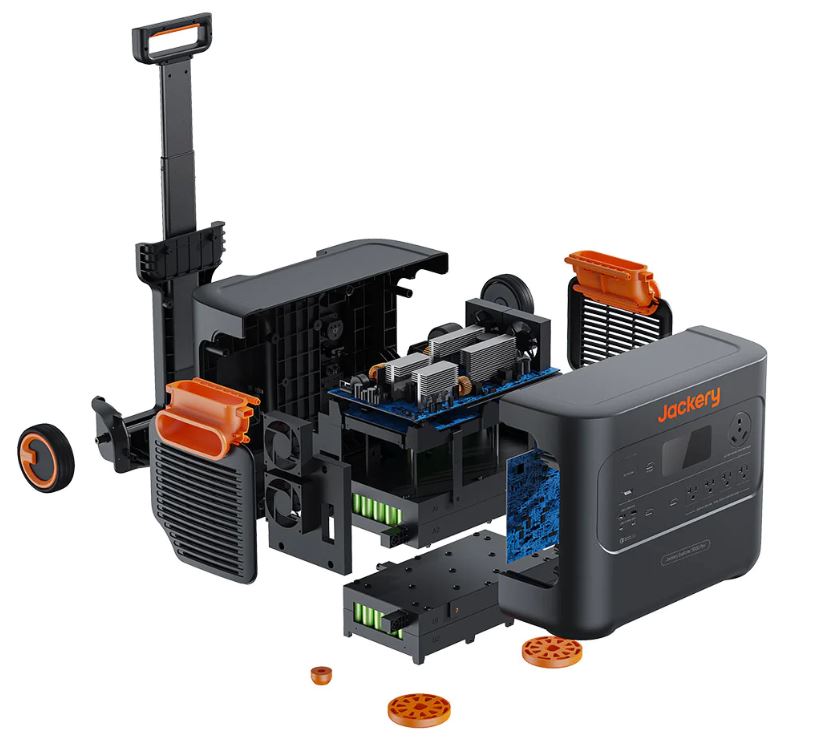
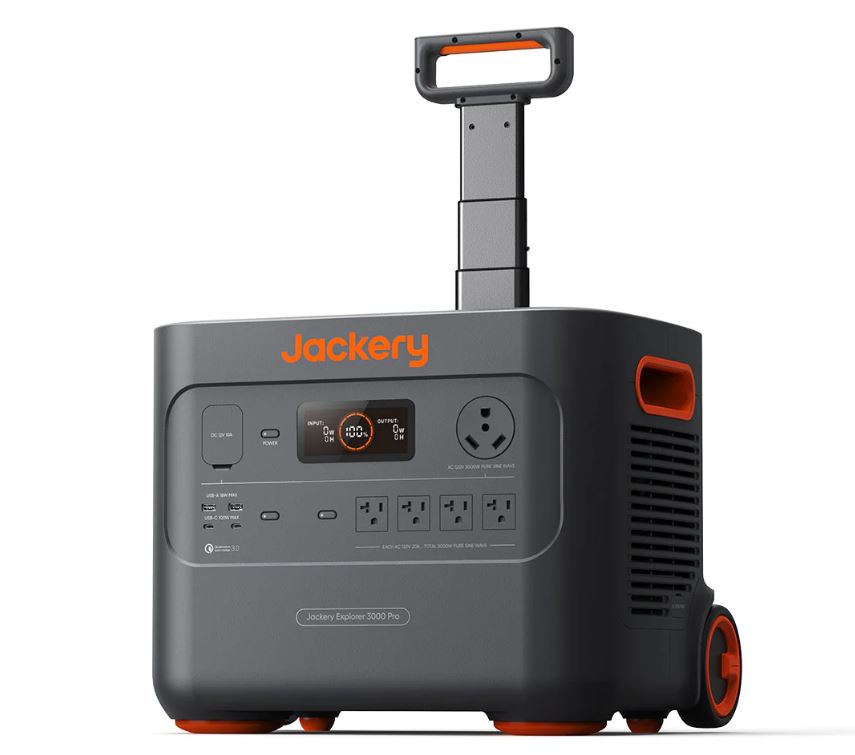
Don’t Buy Jackery 3000 Pro Before Reading This
2. Goal Zero Yeti 1500X:
The Goal Zero Yeti 1500X is a versatile solar-powered generator that offers a 1500W capacity and multiple charging options, including solar panels, AC power, and car chargers. It also features a built-in MPPT charge controller for optimal charging efficiency.
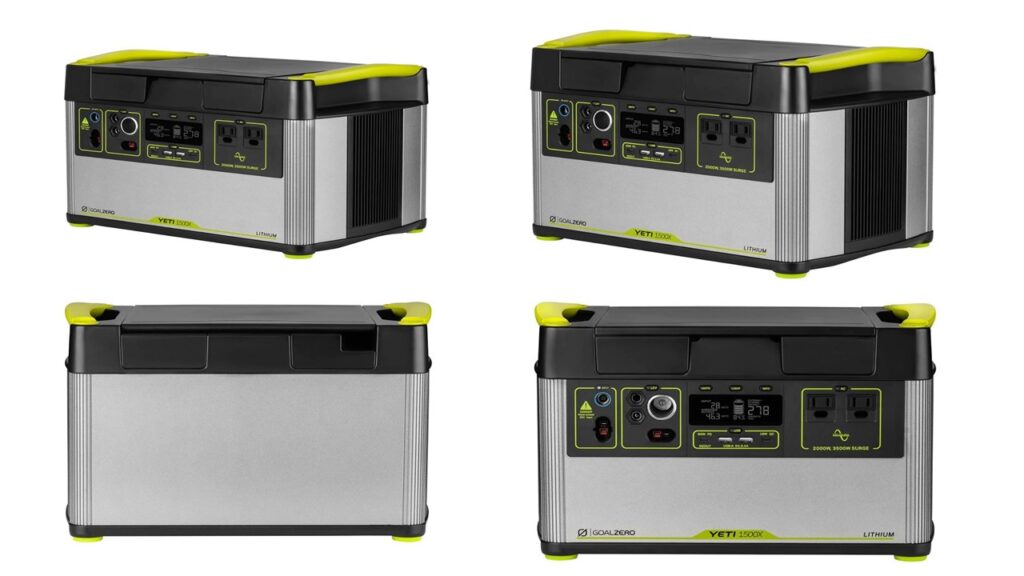
Check this blog post, if you are unsure about Jackery Explorer 1500 and Goal Zero Yeti 1500x “Goal Zero vs Jackery”
3. Bluetti EP500 Pro Solar Power Station:
If your budget is flexible, we have got the perfect solar generator for you. Meet Bluetti EP500 Pro Solar Station, a dependable solar generator for the RV experience. With a power capacity of 5100Wh, it is one of the best solar generators to purchase. Invest in this solar station and experience a tension-free RV life.
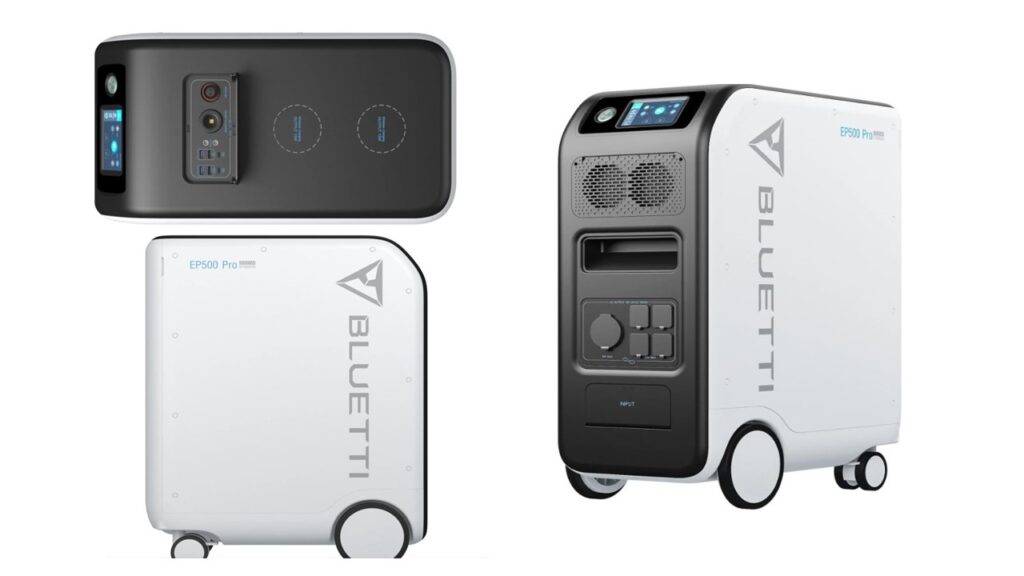
4. Renogy Lycan 5000 Powerbox:
The Renogy Lycan Powerbox is a durable and powerful solar power station that offers a 4800 W capacity and a built-in MPPT charge controller. It also features a sturdy aluminum frame and can be charged using solar panels or AC power.
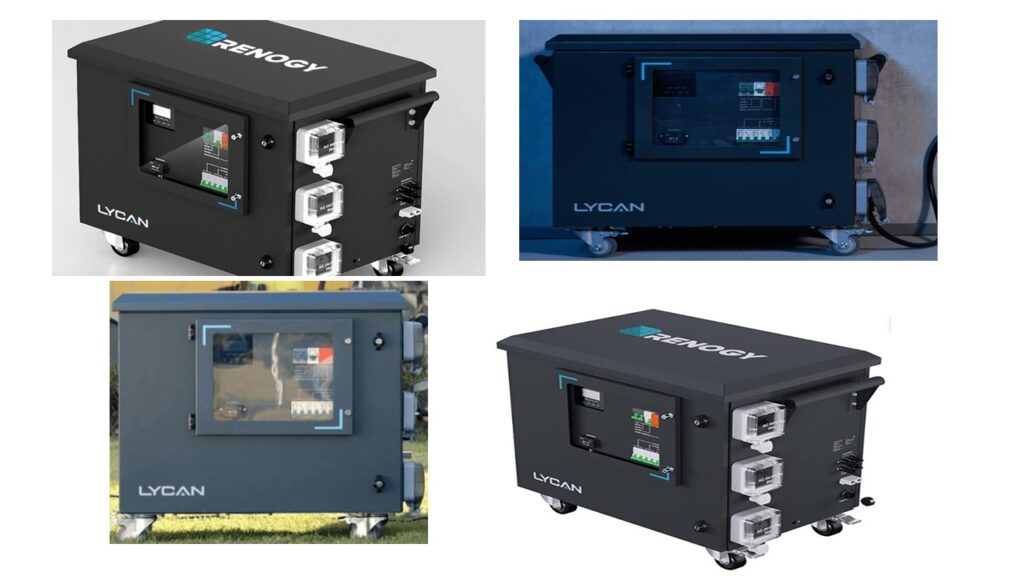
When it comes to solar generators for camping and home backup power, there are several top-rated options to consider. For camping, the Jackery Explorer 500 and Goal Zero Yeti 500x are both reliable and portable solar generators that offer enough power to run small appliances and electronics.
For home backup power, the Goal Zero Yeti 3000 and Generac Guardian offer powerful and reliable solutions for keeping your home appliances and electronics running during a power outage.
Solar generators boast benefits like quiet operation and eco-friendliness, but they also present some challenges. These include potentially insufficient power for running large appliances and higher maintenance requirements compared to traditional generators.
However, for RV owners and those looking for a reliable off-grid power source, solar generators are an excellent option to consider.
Solar Generator FAQs
Q: What can be powered with a solar generator?
A: Solar generators can power a variety of devices, from small electronics like phones and laptops to larger appliances like refrigerators and air conditioners, depending on their wattage and capacity.
Q: How long do solar generators last?
A: The lifespan of a solar power station depends on the quality of its components and how well it’s maintained. On average, a high-quality solar generator can last for 10-15 years or even longer with proper care.
Q: How much do solar generators cost?
A: The cost of a portable solar generator can vary greatly depending on its capacity, brand, and features. Prices typically range from a few hundred dollars to several thousand dollars.
Q: Can a solar generator be used during a power outage?
A: Yes, a solar-powered generator can be used during a power outage as long as it’s charged beforehand. It’s important to note that a solar power station’s capacity may not be enough to power all appliances in a home, so it’s best to prioritize essential devices.
Q: Can I connect a solar-powered generator to my home’s electrical system?
A: It’s possible to connect a solar generator to a home’s electrical system, but it’s important to hire a licensed electrician to ensure that it’s done safely and correctly.
Q: Do portable solar generators require maintenance?
A: Yes, solar power stations require maintenance to ensure optimal performance and lifespan. This can include regularly cleaning the solar panels, checking the battery’s charge level, and replacing any worn out parts.
Q: How do I choose the right solar generator for my needs?
A: When choosing a solar portable power station, consider factors like wattage, battery capacity, weight, and brand reputation. It’s also important to assess your power needs and determine which devices you want to power with the generator.
Conclusion
In conclusion, a solar generator is a reliable and sustainable source of power that can benefit RV owners in many ways. By using a solar generator for RV, outdoor enthusiasts can save money on energy costs, reduce their carbon footprint, and enjoy the convenience of having a portable and versatile power source.
When choosing a solar generator for RV, it’s important to consider factors such as capacity, output power, weight, and warranty. Popular brands such as Jackery, Goal Zero, Anker Power, Renogy, and Generac offer a range of solar generators with varying features and prices.
It’s also important to properly maintain and troubleshoot your RV solar generator to ensure its longevity and optimal performance. Overall, investing in a solar generator can greatly enhance the RV lifestyle and provide a sustainable and reliable power source for off-grid adventures.
